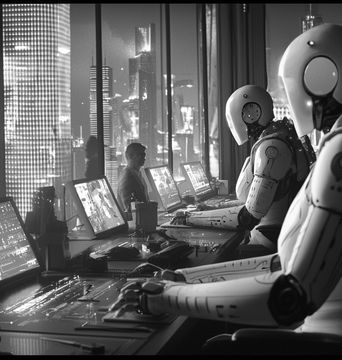AI TAKEOVER: OVER HALF OF LONG POSTS ON LINKEDIN NOW GENERATED BY ROBOTS, HINTS ANALYSIS

The written word has been the foundation of communication and information dissemination since the dawn of civilization. It has evolved over centuries, transforming symbology to complete dialects, veering into intricate literature, and now, machine-generated content. This evolution brings us to an intriguing abstract at the intersection of Artificial Intelligence (AI) and content creation. Over 54% of lengthier English-language posts on LinkedIn, according to Originality AI, are believed to be AI-generated. This revelation gestures towards a near future that is likely to be shaped significantly by digital technology.
A wave of AI adoption has swept contemporary social media, particularly professional networking platforms like LinkedIn. This shift, prevalent since the outset of 2023, is marked by a significant surge in AI generated posts -- a whopping 189% increase according to Originality AI.
Despite LinkedIn not officially tracking the posts written or edited with AI tools, it engages defenses to detect low-quality or duplicate content. This stands as a testament to the platform's commitment towards ensuring originality and quality. Linkedin has also availed its in-house AI writing tools exclusively to its Premium subscribers, offering services to rewrite posts, profiles, and direct messages.
The rising popularity of this professional networking platform amongst Gen Z and a network of influencers is a key driver in the escalating AI usage one observes. Many of these users utilize AI to generate content, attract attention, and establish their professional brand. Non-native English speakers are also turning to AI to improve the quality and grammar of their English posts, thereby ensuring seamless communication in this global networking sphere.
However, this rapidly emerging trend of AI reliance is not devoid of criticism. Many believe that leveraging AI diminishes the value of human creativity and writing skills, posing a credible threat to professional opportunities in fields necessitating written content. With bots gradually taking over the sphere of content generation, there arises a dichotomy between the traditional art of writing and AI's efficiency.
Feedback among LinkedIn users who utilize AI tools is admittedly mixed. While some appreciate the streamlined content and convenience these tools bring, others are skeptical about their usage, advocating instead for organic human interaction and content.
The professional and generally neutral tone associated with LinkedIn content inadvertently positions the platform as a testing ground for AI writing tools. Here then the future of AI in creative fields is being written. Consequently, the emerging question is - how will our reliance on such technologies shape future communication and creative intervention? As the worlds of AI and human creativity increasingly intersect, this boundary-pushing phase marks the next step in the evolution of the written word as we know it.
How AI will revolutionize or simplify our future remains an active conversation. What is important, however, is that we acknowledge the immense potential of AI in shaping our work and create collective guidelines that ensure it augments human creativity and expression rather than supplanting it. After all, the written word holds within it the essence of human emotion, something that AI, as intelligent as it might become, can not replicate.